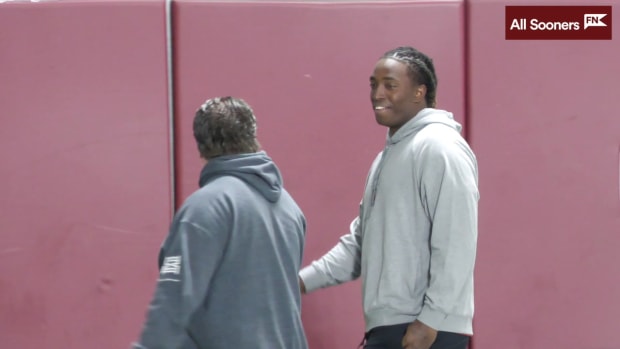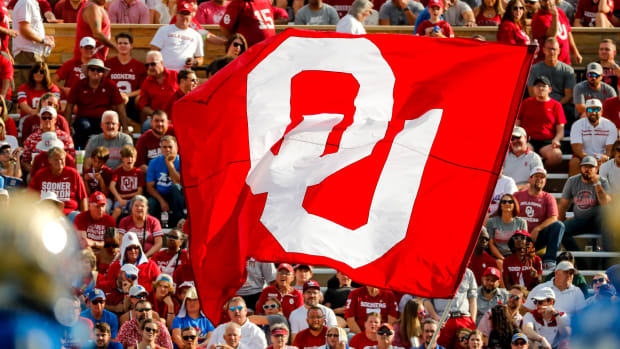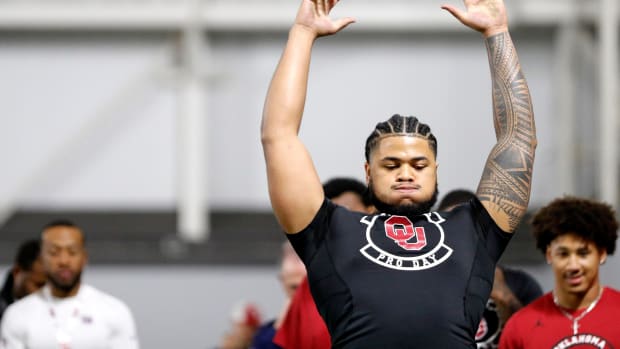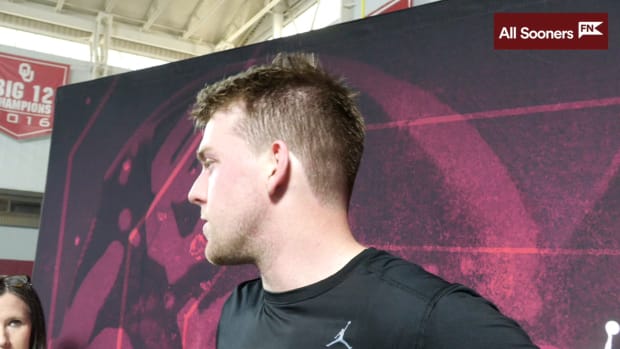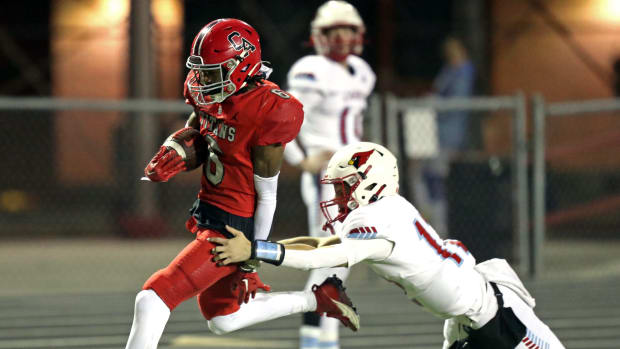COMMENTARY: My Heisman ballot: My guy got robbed, and that's fine with me
I couldn’t get past the 27 touchdowns.
After leading all of college football with 27 TDs this season, Alabama running back Najee Harris somehow was not among the 2020 Heisman Trophy finalists — and so he was apparently never a contender to win the 86th Heisman Memorial Trophy that went on Tuesday to 'Bama teammate DeVonta Smith.
In this, the most flawed of college football seasons, I voted for Harris as my Most Outstanding Player of the 2020 season — No. 1 on my Heisman ballot, even though he finished fifth in this year's balloting.
And I'm OK with that, because Smith, his amazing teammate, was every bit as worthy, winning comfortably and becoming the first receiver to win the award since Desmond Howard in 1991.
I’m fortunate and always honored to be one of 22 media voters in the state of Oklahoma (there are 870 media voters nationwide in 49 states, New York City and Washington, D.C). I’ve been voting on the Heisman since 1998. This was, without a doubt, the most difficult Heisman ballot I’ve ever put together.
Although Harris was not a finalist this year, he had two teammates — wideout DeVonta Smith and quarterback Mac Jones — who were. Also, Clemson quarterback Trevor Lawrence and Florida quarterback Kyle Trask were finalists and attended this year’s ceremony virtually.
Behind Harris, Breece Hall of Iowa State, Justin Fields of Ohio State, Zach Wilson of BYU, Ian Book of Notre Dame and Kyle Pitts of Florida rounded out the top 10 of this year's voting.
I went with Harris over Smith because of the end zone productivity, yes, but also because of the sheer workload Harris provided for the undefeated Crimson Tide this season: 229 rushes and 36 receptions, compared to Smith’s 105 receptions, four rushes and 12 returns. That’s 22 touches a game for Harris, 10 for Smith.
Harris also ranked fifth nationally in all-purpose yards at 1,733 — 1,387 rushing and 346 receiving — which, I noted, was behind Smith’s 1,912.
It was a tough call, and both guys were worthy of this year’s award.
But I find it inconceivable that Harris wasn’t a Heisman finalist, and it’s silly for anyone to justify it by trying to diminish his 2020 accomplishments.
One All-America voter declined to put Harris on the first-team and seemed to justify the opinion by noting that Harris wasn’t Barry Sanders or Jim Brown.
First off, who is Sanders or Brown? Sure, by those standards, Harris might be considered slightly above average. But whatever that voter’s motivation was, it sounds like excuse-making for some underlying dislike.
But then you see Harris hurdle Notre Dame’s Nick McCloud — a 6-foot defensive back standing upright — in the College Football Playoff semifinal, without being touched, on his way to a 53-yard run and you wonder … could Barry Sanders or Jim Brown have done THAT?
Harris is a special player. He’s a unique talent. Just ask Florida, who watched him pile up 243 all-purpose yards and cross the goal line five times in the SEC Championship Game.
But the simple fact was this was a hard year to vote on. This year, especially, it seemed like there was no wrong answer.
I love Harris’ season. But I think I love DeVonta Smith’s season just as much if not more. Smith is more explosive, to be sure. He was 11th in the nation in all-purpose yards per game (159.3; Harris was 21st at 144.4) and led all of college football in receptions (105), receiving yards (1,641) and receiving touchdowns (20).
Once I settled on Harris, Smith was an easy choice for my No. 2 spot.
Jones wasn’t on my ballot — one might ask who couldn’t have success quarterbacking the Crimson Tide with all these weapons — but he’s about to set NCAA records for completion percentage (.770; Colt McCoy holds the record at .767) and passer efficiency rating (203.0; Joe Burrow set the record last year at 202.0) — and oh, by the way, he’s second in the nation with 4,036 passing yards and 36 TD passes.
And has led college football’s No. 1-ranked team back to the national championship game.
Trask is a good choice. All he did was lead the nation in touchdown throws by seven over Jones (43) and in passing yards by almost 250 yards over Jones (4,283). He completely reengerzied the Gators’ offense, despite having almost no running game to speak of.
I also considered BYU QB Zach Wilson, North Carolina QB Sam Howell, Notre Dame QB Ian Book and Clemson QB Trevor Lawrence. Lawrence has been the face of college football and deserves something for his career achievements. But he did not have a Heisman-type year. Missing two games with COVID didn’t help — you can’t win if you don’t play. That's heightened for quarterbacks.
The Heisman has become a quarterback award, and that’s fine. College football is built around quarterbacks now. Games without at least decent QB play somehow feel lessened.
But I pulled apart a handful of other running backs, too: Buffalo’s Jaret Patterson (178.7 yards per game, including games of 301 and 409 yards, but he only played six games), Iowa State’s Breece Hall (nation-leading 1,572 yards, 21 touchdowns), North Carolina’s tandem of Michael Carter (1,245 yards, nine TDs) and Javonte Williams (1,140 yards, 19 TDs) and Minnesota’s Mohamed Ibrahim (153.7 yards per game, 15 TDs).
And although Smith was the only wideout who finished this season with a legit chance of winning, I also checked out Mississippi’s Elijah Moore (86 catches, 1,193 yards, 8 TDs) and North Texas’ Jaelon Darden (74 catches, 1,190 yards, 19 TDs).
There was, of course, one defensive player I put third on my ballot: Tulsa linebacker Zaven Collins.
I can’t say with certainty that any player had a bigger impact on his team this season, and in the six or so games I watched Tulsa this year, I don’t know if any player could make a claim to being more “outstanding” than Collins.
Tulsa only played eight games this season, and Collins — while fighting through multiple injuries — accounted for 1.4 tackles for loss per game. That ranks 27th nationally. He also had four interceptions, which ranks as the third-highest total in the nation.
While leading Tulsa to a 6-3 resurgence and a trip the American Athletic Conference title game — where TU nearly shocked undefeated Cincinnati — Collins literally won two games with interceptions: one to end a 28-24 win over SMU, the other a 96-yard pick-six in overtime against Tulane. He also had a game-turning pick against UCF, and another pick-six against South Florida.
Only an AAC player? That notion was debunked in the Golden Hurricane’s season opener when, after TU hardly practiced, he was the best player on the field in a narrow loss at Oklahoma State, with three quarterback sacks, four tackles for loss and six total stops.
Collins did win the Bronko Nagurski Trophy as college football’s best defensive player and has made several first-team All-America lists. So his appearance on my ballot was deserved.
So many great players. So few games. Such a disjointed, uneven, weird season.
But 2020 delivered just enough to feel good about this year’s Heisman vote.



